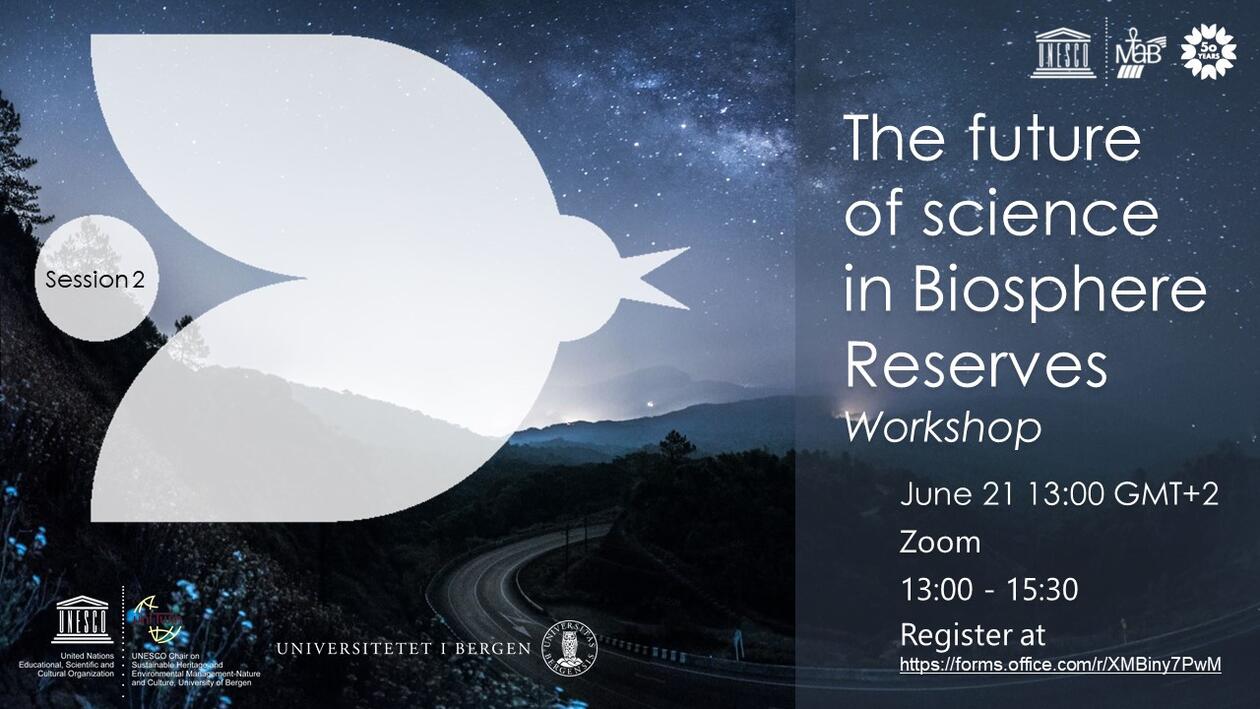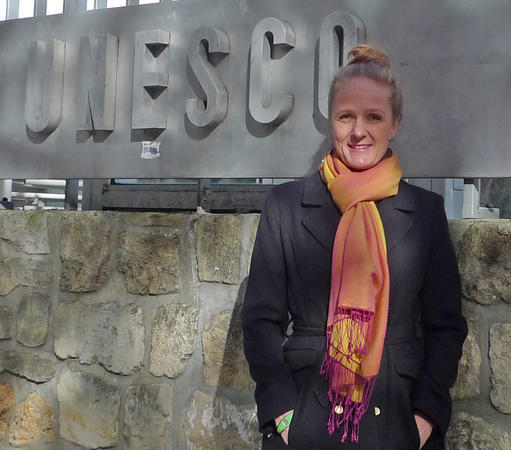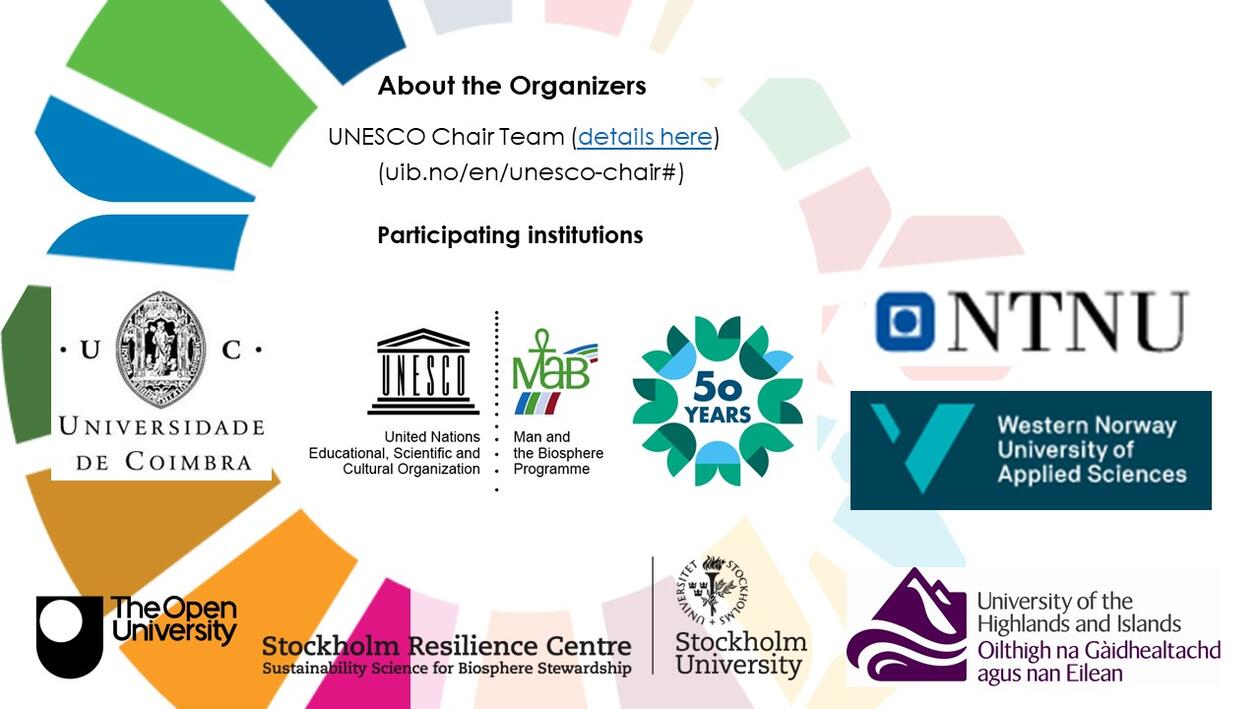Celebrating the 50th Anniversary of UNESCO's Man and the Biosphere programme
Science for People and Nature: The UNESCO Chair team at the University of Bergen is hosting a webinar celebrating the contribution of research to the evolution of UNESCO’s Man and the Biosphere (MAB) programme throughout the last 50 years. During the morning session we will present and discuss emerging research in sustainability science linked to Biosphere Reserves, with examples from our partner networks. In the afternoon we will host a participatory workshop to identify future research horizons in the MAB programme open to all researchers and practitioners part of the MAB and Biosphere Reserve community.
Main content
Morning Session (9:00-12:00 GMT+2) - Science for People and Nature: Talks and Panel. You can follow the morning session on YouTube here.
From Research to Action: Seminar session on the past, present and future of BR research. We celebrate the contribution of research to the evolution of UNESCO’s Man and the Biosphere programme featuring presentations on current research in the field of sustainability science in Biosphere Reserves. We also facilitate a conversation between sustainability scientists connected to the UNESCO Chair and people with in depth knowledge of the MAB-programme.
Speakers include:
- Meriem Bouamrane, Chief of Section on MAB Research and Policy, Ecology and Biodiversity, Man and the Biosphere programme, UNESCO Paris, FRANCE
- Martin Price, Professor Emeritus from MAB UK and Founding Director of the Centre for Mountain Studies, University of Highlands and Islands, SCOTLAND
- Lisen Schultz, Deputy Director of Transdisciplinarity, Stockholm Resilience Centre, Stockholm University, SWEDEN
- Helena Freitas, UNESCO Chair and director of the Centre for Functional Ecology - Science for People & the Planet (CFE), Department of Life Sciences of the Faculty of Sciences and Technology, University of Coimbra, PORTUGAL
- Rosalind Bryce, Director, Centre for Mountain Studies, University of Highlands and Islands, SCOTLAND
- Xiaonge Ping, researcher at the executive office of Scientific Authority of CITES in China, CHINA
- Isaac Yaw Barnes, Using story telling through a geo-story map to highlight Bia River Biosphere Reserve's anthropogenic effect on community livelihood and adaptation. GHANA
- Kaera Coetzer-Hanack, researcher at Rhodes University, SOUTH-AFRICA
- Jarrod Cusens, PhD-candidate at the University of Bergen, NEW ZEALAND
- Siri Granum Carson, Director, NTNU Oceans, Norwegian University of Science and Technology (NTNU), NORWAY
- Shonil Bhagwat, Professor of Environment and Development, the Open University, UK
- Jens Kristian Fosse, Dean at the Faculty of Engineering and Science, Western Norway University of Applied Sciences, NORWAY
- 9:00-9:05 TECH CHECK AND ARRIVAL
- 9:05-9:15 Welcome by Inger Måren
- 9:15-9:30 Celebrating MAB 50th Anniversary: how young do we feel? by Meriem Bouamrane, UNESCO
- 9:30-9:45 Mountains, science and biosphere reserves: Reflections on five decades of the MAB Programme by Martin Price
- 9:45-10:00 Global Biosphere Reserve Survey by Lisen Schultz & Alicia Barraclough
- 10:00-10:15 Biosphere Reserves: Sustainable territories, Resilient communities by Helena Freitas
- 10:15-10:30 CULTIVATE: Co-creating cultural narratives for sustainable rural development by Rosalind Bryce
- 10:30-10:40 COFFEE/TEA BREAK GUEST SPEAKERS SESSIONS
- 10:40-10:50 Biosphere Reserves and biodiversity conservation in China by Xiaoge Ping
- 10:50-11:00 Using story telling through a geo-story map to highlight Bia River Biosphere Reserve's anthropogenic effect on community livelihood and adaptation by Isaac Barnes
- 11:00-11:10 Mapping the connections between people and nature: participatory mapping of ecosystem services in a Nordic biosphere reserve by Jarrod Cusens
- 11:10-11:20 Transformative institutions [needed] for responding to the challenges of the Anthropocene by Kaera Coetzer-Hanack
- 11:20-12:00 Panel Conversation: How can science and the MAB-programme contribute to the deep transformation needed for a sustainable future? Panellists are Siri Granum Carson, Shonil Bhagwat, Jens Kristian Fosse, Lisen Schultz, Martin Price and Meriem Bouamrane, chaired by Inger Måren
- 12:00-13:00 LUNCH BREAK
Chairing the morning session:
- Alicia Barraclough, Postdoctoral fellow of the UNESCO Chair, University of Bergen, UK
- Inger Elisabeth Måren, UNESCO Chair on Sustainable Heritage and Environmental Management, University of Bergen, NORWAY
You can follow the morning session on YouTube here.
Afternoon Session (13:00 - 15:30 GMT+2) – The future of Science in Biosphere Reserves: A workshop
Can we get there from here? A core mission of the MAB programme is to "establish a scientific basis for the improvement of the relationships between people and nature". In this workshop we will go deeper into what this means by asking, which are the most pressing knowledge gaps the Biosphere Reserve scientific community should be addressing?
To answer this question, we will host a participatory horizon scan workshop for the community of researchers and relevant stakeholders working in Biosphere Reserves around the world. A "Horizon Scan" is a method used to collectively identify research priorities and co-create a research agenda based on the most pressing knowledge gaps in a field. The workshop will be interactive, and participants will get the opportunity to discuss and debate with other members of the community about key knowledge advancements needed to progress the goals of the Lima Action Plan.
Thank you for registering! Registration is now full.










